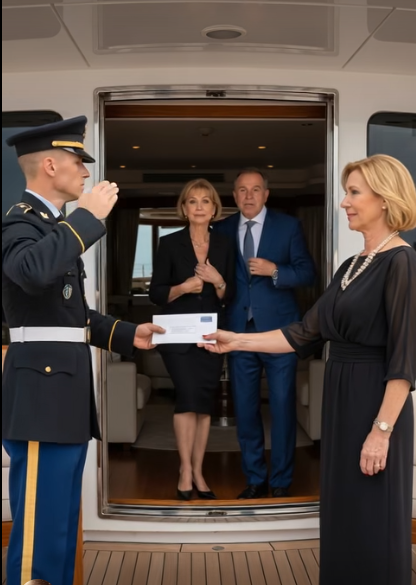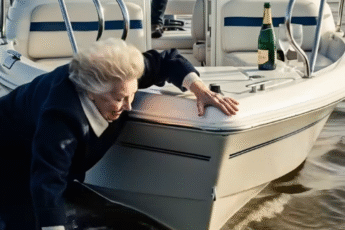The yacht, the Legacy, was a magnificent white beast, cutting gracefully through the turquoise Caribbean waters. To me, however, it felt like a gilded cage. The Vance family had organized this trip to commemorate General Arthur Vance a year after his passing. They called it a tribute, but I knew better. It was a power play, a carefully orchestrated social event for the General’s eldest son, Marcus, and his second wife, Eleanor, to cement their status as heirs to the Vance empire.
I, Anna, widow of the General’s youngest son, David, was an unwanted ornament in this drama. My husband had been an artist, a gentle soul in a family of wolves, and they had never forgiven him for his perceived weakness, nor me for being his choice.
Just before the ceremony began, Marcus found me standing alone by the rail. He approached, his face a mask of false concern. “Anna,” he said, his voice low. “Just wanted to be sure you were alright. It’s going to be an emotional day. The coming service… it’s intensely private. It might be better for you to get some air out here. We wouldn’t want to cause you any more distress.” The words were kind, the subtext was clear: You do not belong.
When the guests—politicians, defense contractors, social titans—were gathered in the main lounge, Marcus stood, a leather-bound folio in his hand. “Thank you all for being here,” he began. “Now, if you’ll excuse us, the family would like to have a private moment to read our father’s final words.”
Eleanor, draped in tasteful black couture and a string of pearls worth a sedan, turned to me. Her smile was saccharine sweet, but her eyes were chips of ice. “Anna, dear,” she said, her voice loud enough for those nearby to hear. “This is for blood relatives only. A moment for the core family to reflect. I’m sure you understand.”
The exclusion was public, calculated to sideline me, to remind me of my place: an outsider, a temporary footnote in the grand Vance chronicle. All eyes turned to me.
I did not argue. I did not shed a tear. That would have given them the satisfaction they craved. Instead, I met Eleanor’s gaze and gave a single, graceful nod. “I understand,” I said, my voice calm and even.
Then I turned and walked out onto the deck. The warm sea breeze felt good on my face, but it couldn’t touch the chill in my heart. My reaction was not weakness; it was endurance. I made my way to the bow, seeking a quiet place to honor the General in my own way. I remembered the afternoons he’d spent in David’s art studio, his sharp eyes full of genuine curiosity for his son’s canvases. He was the only one in this family who saw the strength in David’s sensitivity. “Courage comes in many forms, Anna,” he had told me once. “Not all battles are fought on a battlefield.”
I recalled a specific memory, about six months before both David and the General were gone. We were in David’s studio. Marcus had stopped by, all expensive tailoring and condescension, and looked at one of David’s vibrant, abstract paintings with a sneer. “I still don’t get why Father wastes money on this… hobby of yours,” Marcus had scoffed. “It’s not going to amount to anything.”
David had only smiled sadly, but the General, who had been sitting in a corner, spoke up, his voice a low rumble. “Son, you see paint and canvas. I see a man wrestling with chaos and creating order from it. That’s a form of discipline you’ll never understand.” Marcus had bristled and left shortly after. Later, the General turned to me. “They think David is weak,” he’d said. “But he has an integrity that money can’t buy. That’s the real legacy. Remember that, Anna.”
Inside, Marcus began to read the decoy letter. His voice, thick with feigned emotion, recited empty platitudes about honor, legacy, and succession. “I entrust my legacy to my son, Marcus, and my beloved wife, Eleanor,” he read, a smug smile touching his lips. “I know they will carry on the family’s work with strength and conviction.”
Marcus and Eleanor’s mistake was their supreme arrogance. They believed this sentimental letter was the General’s only final testament. They thought they controlled the narrative, the vast fortune tied to the Vance Family Military Foundation. They had completely discounted me.
But they didn’t truly know the General. He was a master strategist. He knew his eldest son and second wife’s greedy nature. He knew they would turn his legacy into a vehicle for their own avarice. So he had prepared.
His entire legacy was a complex web of military trusts and charitable foundations, structured with the protocols of a command operation. The “private” letter Marcus was reading was a decoy. The real, legally binding directive was hidden elsewhere.
The shocking factor wasn’t in flowery prose, but in a cold, precise order. The “coded order” in the real letter I was about to receive was a legal and military directive. As a five-star general, he had the authority to place his trusts under specific command protocols. That order instructed his designated military executor (a trusted colleague at the Pentagon) to immediately transfer all voting rights and control of the multi-billion-dollar Vance Family Military Foundation to the one person he trusted to protect its true purpose: me, Anna Vance.
The trap was set by the General years ago. He created a complex legal structure that could only be unlocked by this specific protocol. He knew his family would hold this ostentatious memorial. He knew they would publicly diminish me. And he had left final instructions for his loyal, young aide-de-camp, Lieutenant Davis.
Davis’s mission was simple: during the memorial service, retrieve the General’s old dress uniform from its storage locker. Inside the breast pocket, stitched into the lining, would be a wax-sealed envelope. Find Anna Vance and deliver it to her.
So while Marcus and Eleanor were smugly reading empty words inside, Lieutenant Davis was executing the General’s final mission on the deck. He found the uniform, felt the stiff envelope inside the lining, and with a small knife, carefully cut it free. He held the envelope in his hand, feeling its weight, and began to look for me.
I was at the bow, watching the endless ocean, when a voice came from behind me. “Mrs. Vance?”
I turned. Lieutenant Davis stood there, tall and imposing in his crisp white dress uniform. He couldn’t have been more than 25, but his eyes held the seriousness of a much older man.
He snapped to attention, raising his hand in a sharp, formal salute. “Ma’am, we’ve found the letter the General left for you. The coded order within is effective immediately.”
He handed me a thick, cream-colored envelope, sealed with the General’s personal wax signet. My hand trembled slightly as I took it. I broke the seal.
Inside was a handwritten letter and a compact satellite phone. The letter was short, the General’s powerful script unchanged.
“Anna, they are wolves. The Foundation is the heart of my legacy. It is not for empire-building, but for serving my soldiers. Protect it. The power is now yours. Call the pre-programmed number. Read the code. David would be so proud of you. – A.V.”
Below it was an alphanumeric string. I powered on the satellite phone. It connected instantly. I pressed the single call button. A gruff, professional voice answered immediately, no greeting. “Executor’s office.”
“I have a directive to authenticate,” I said, my voice surprisingly steady. “Authentication code Alpha-Victor-Seven-Niner-Tango-Zulu.”
“Acknowledged, ma’am. Processing. The directive is validated and effective immediately. Notifications are being sent. Have a good day.” The line went dead.
In the lounge, Marcus had just finished the last words of the fake letter. He lifted his head, a solemn smile on his face. “To my father, and to the future of the Vance family, a future now secure in capable hands.”
Polite applause trickled through the room. Marcus and Eleanor shared a triumphant look. And then, Marcus’s phone buzzed violently on the small table beside him. He frowned, annoyed at the interruption. He glanced at the screen. It was the family lawyer.
“What?” he snapped into the phone. “I’m in the middle of something.”
The voice on the other end was frantic. “Marcus, what the hell is going on?! This isn’t a request, it’s a military order! It overrides everything! The executor is some Colonel at the Pentagon! What did you do?!”
“What are you talking about?” Marcus hissed.
“The Vance Foundation! I just received a priority one directive from the Pentagon. You’ve been removed. Eleanor, too. All control has been transferred.”
The color drained from Marcus’s face. “Transferred? To who?”
“To… my God… to Anna Vance.”
Marcus slowly turned his head. He looked through the lounge’s large glass windows. And he saw me. Standing on the bow, holding a satellite phone, looking directly at him with calm, steady eyes. He burst through the doors and stormed onto the deck, his face purple with rage.
“What did you do?” he screamed, pointing a trembling finger at me.
“I simply accepted a gift from the General,” I replied, my voice as cold as the deep ocean.
“This is illegal! I’ll sue you! I’ll destroy you!”
“The General taught me that courage comes in many forms, Marcus,” I said, meeting his gaze without flinching. “Not all battles are fought on a battlefield. This one is over.”
The destruction of Marcus and Eleanor was not financial—they still had their personal inheritance. It was far deeper. They lost the only thing that mattered to them: power. The Foundation was the source of their political influence, their lucrative defense contracts, their lofty social standing. Without it, they were just wealthy, powerless individuals. There on the yacht, as the news spread, the important guests began making excuses and melting away, avoiding their gaze. Their power evaporated before their very eyes.
For me, it was a rebirth. I was no longer the powerless widow, the pitiful outsider. I was now at the helm of one of the most influential military philanthropic funds in the world. I was the guardian of General Vance’s true legacy. I had a purpose, and I had the power to enact real change.
A year later. I am not on a yacht. I am standing on a simple stage at the opening of the David Vance Rehabilitation Center, a new, state-of-the-art facility for wounded veterans, funded entirely by the Vance Foundation. Lieutenant Davis, now my trusted chief of staff, stands by my side.
I look out at the crowd—at the young soldiers, their families, the doctors and nurses—and I end my dedication speech.
“General Vance taught me that true honor isn’t about the ceremonies you hold, but about the people you protect. His legacy isn’t in a name carved on marble, but in the lives we can change for the better.”
My happy ending isn’t about gaining wealth, but about inheriting a mission. Standing there, continuing the work that both my husband and his father would be proud of, I have finally found my own strength and purpose. I was honoring them in a way the “blood relatives” never could.





